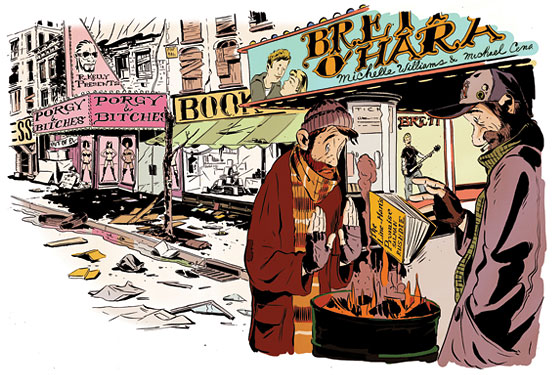
Things aren’t going well for the American economy right now. You might have noticed. But look on the bright side! The Great Depression 1.0 inspired tremendous works of art: From Dorothea Lange to Tom and Ma Joad, the thirties represented one of the great fertile periods of American culture, and there’s no reason to expect that the Great Depression 2.0 won’t do the same.
Migrant Banker
Commemorating Dorothea Lange’s legendary 1936 photo of a grim California farmworker, prominent American artists take to the streets and fields, documenting the difficult lives of the American poor. Results are mixed; Chuck Close’s enormous canvases portraying New York’s homeless are praised, but critics call Andres Serrano’s photos of farmer’s shit and Jeff Koons’s balloon-animal hobos “reductive.” The project is abandoned after Christo wraps downsized stockbroker Stanley M. Krystkowiak in plastic, suffocating him.
Brett and O’Hara
Andrew Bujalski directs this mumblecore update of the 1939 classic Gone With the Wind starring Michael Cera and Michelle Williams. Made for half the original’s $3.7 million budget, Brett and O’Hara limits its action to a single week in one Williamsburg neighborhood rather than the ten-year sweep of southern history covered in the original. (The Civil War is replaced by a local battle of the bands.) When the movie is screened in Brooklyn, the response is overwhelming, and the movie’s iconic moments—O’Hara standing in her ruined garden intoning, “I’m sorta hungry”; Brett declaring, “Frankly, O’Hara, whatever”—quickly enter the vernacular.
The Line-Man’s Promise
Tired of being labeled a scenester celeb hound with no relationship to the common man, Salman Rushdie sets out to create a modern-day Grapes of Wrath. Rushdie succeeds beyond his wildest dreams—his Steinbeckian chronicle of an Ohio clan’s search for work, which ends on a bittersweet note of hope in a Bangalore call center, is hailed as a masterpiece. Citing the novel’s vast influence on American life, the Pulitzer board modifies its rules to make a foreigner eligible for the fiction prize. Rushdie accepts it via satellite phone while dining with Marc Jacobs at the Waverly Inn.
The WPA Guides
As the economy’s collapse impoverishes millions, the government reaches out to unemployed bloggers, sending them across the country to update the Federal Writers’ Project American Guide Series. The project goes south when participants refuse to leave their apartments; eventually, editors reluctantly publish a collection consisting of 112 Hills recaps and a chapter called “My Friend Emily Went to Idaho and Said It Sucked.”
The Federal Theatre Project
With theater-ticket sales languishing owing to general impoverishment, the government reinstates the Federal Theatre Project, staffing it with literary managers from top Off Broadway and regional theaters. The first original play, The Cradle Will Fall, goes through a public reading, a rewrite, a staged reading, a rewrite, three weeks of rehearsals, a rewrite, a backers’ audition, a rewrite, three workshops, a rewrite, and six title changes before being abandoned in 2015.
Porgy and Bitches
Slow-jammer R. Kelly writes, scores, and directs this reimagining of the classic Gershwin opera, which tours to sold-out crowds. Kellz himself plays the lead role and, in the show’s signature moment, sings “I Loves You, Porgy” to himself in a mirror while having sex with seven women. Though it’s a critical triumph, some audiences are baffled by the story’s unlikely tangents, like the entire fourteenth act taking place on the moon. Sued by the Gershwin estate for copyright infringement, Kellz represents himself before the Supreme Court, delivering his oral argument in song. After the soaring climax, Justice Antonin Scalia breaks a stunned silence with a slow clap that eventually spreads around the room and becomes a standing ovation.